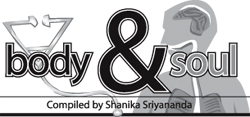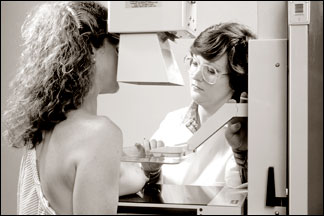|

Learning about breast cancer
by Dr. D.P. Atukorale
 As I am a cardiologist interested in nutrition especially in
nutritional aspects of cancer, I am discussing the role nutrition plays
in prevention of breast cancer which is the commonest cancer among women
in our country. Most of the facts about the risk factors about breast
cancer were obtained from the famous book "China Study" which is the
most comprehensive study of nutrition ever conducted." As I am a cardiologist interested in nutrition especially in
nutritional aspects of cancer, I am discussing the role nutrition plays
in prevention of breast cancer which is the commonest cancer among women
in our country. Most of the facts about the risk factors about breast
cancer were obtained from the famous book "China Study" which is the
most comprehensive study of nutrition ever conducted."
Cancer affects hundreds of thousands of Americans (and thousands of
Sri Lankans) and the most common cancers in US are breast cancer, colo-rectal
cancer, prostate cancer, ovarian cancer and lung cancer. In Sri Lanka as
far as I am aware breast cancer is the most common cancer among women.
The commonest cancer among Sri Lankans is oral cancer.
I am discussing the current research about breast cancer and how Sri
Lankans can reduce the incidence of this cancer especially if breast
cancer runs in your family (Other common diseases which may run in your
families are type 2 diabetes, hypertension, coronary heart disease, and
certain cancers such as colorectal cancer).
Some of the readers, I am sure, are aware that if you are a female
with a strong family history of breast cancer and if you have the breast
cancer genes BRCA - 1 and BRCA - 2 (which run in some families) you may
be a candidate for breast cancer especially if you take a diet high in
animal foods and refined carbohydrates.
I inquired from a very popular oncologist colleague who told me that
blood test for above genes BRAC - 1 and BRAC - 2 cannot be done in Sri
Lanka at present.
IN U.S., one out of eight American women are diagnosed with breast
cancer during their life times, one of the highest rates in the world.
Risk factors of breast cancer
There are at least 4 important breast cancer risk factors that are
affected by nutrition and these are
(a) Early age of menarche (first menstrual bleeding of the human
female which occurs during puberty). Diet high in animal food and
refined carbohydrates lowers the age of menarche.
(b) Late age of menopause (i.e. time during which a woman gradually
stops menstruation, usually at around 50 years.) A diet high in animal
foods and refined carbohydrates is known to raise the age of menopause.
(c) High levels of female hormones (e.g. oestrogens, progesterone
etc) in the blood. A diet high in animal products and refined
carbohydrates raises female hormones.
(d) High blood cholesterol. A diet high in animal products especially
diet containing red meat and dairy products and food items containing
high cholesterol raises your blood cholesterol level.
There is overwhelming evidence that oestrogens and other female
hormone levels are a critical determinant of breast cancer risk (Brestein
L and Rose R.K., Epidemiol. Revs 15 (1993) 48-65) and oestrogen directly
participates in the cancer process and increased levels of oestrogens
and other related hormones are a result of the consumption of typical
Western diets high in fat and animal protein and low in dietary fibre.
When oestrogen levels of rural Chinese women were compared to Western
women, it had been found that 17 percent decrease in oestrogen level
would account for a high difference in breast cancer rate.
This idea that breast cancer in centred on oestrogen exposure is
profound, because, diet plays a major role in establishing oestrogen
exposure.
This suggests that the risk of breast cancer is preventable if we eat
well and keep the oestrogen levels under control. Most of the Sri Lankan
women I am sure are not aware of this evidence. It is the duty of the
doctors to give health education as to prevent cancer among Sri Lankans
as all types of cancers are increasing in epidemic proportions.
Genes
Genes do play a role in the development of breast cancer and certain
other cancers. Even if there is a family history of breast cancer, the
risk of getting breast cancer can be minimized by taking a proper diet.
Among genes that influence breast cancer risk, BRCA - 1 and BRCA - 2
have received most attention since their discovery in 1994. These genes
when mutated confer a higher risk both for breast cancer and ovarian
cancer.
These genes are not the only genes than participate in the
development of breast cancer. It is noteworthy that the mere presence of
BRCA - 1 and BRCA - 2 or any other breast cancer gene does not guarantee
disease occurrence. Environmental and dietary factors play a central
role in determining whether these genes are expressed.
A recent paper, (a meta analysis) reviewed 22 studies that assessed
the risk of breast cancer among women who carried mutated BRCA - 1 and
BRCA - 2 genes.
Overall disease risk for breast cancer was 65 percent and 39 percent
for ovarian cancer, by age of 70 and for BRCA - 1 women and BRCA - 2
women risk was 45 percent and 11 percent respectively. Even for these
high risk women more attention paid to diet is likely to pay handsome
rewards. About half the women who carry these rare genes do not get
breast cancer.
These women with family history of breast cancer are encouraged to
get regular screening for breast cancer. Facilities for mammography are
available both in teaching hospitals and in the private hospitals.
Unfortunately the genetic tests, I understand cannot still be done in
Sri Lanka and these facilities are available in India, Singapore and
other more developed countries.
Mammography definitely helps early detection of breast cancer and
cancer treatment is more successful if cancer is detected at an earlier
stage and survival for 5 years is higher if the cancer is detected
early.
Non-nutritional prevention
For women who have high risk of breast cancer due to family history
and / or to presence of BRCA genes have several options such as (a)
taking a drug called tamoxifen for several years.
Tamoxifen is an anti - oestrogen drug which has several side effects
such as stroke, uterine cancer, cataracts, deep vein thrombosis and
pulmonary embolism and these side effects are not common and tamoxifen
is an expensive drug.
Other alternative to prevent breast cancer in females is to start
them on low - fat, low animal - based food diet from the age of eight to
10 years for seven years Cancer Inst., 95 (2003) 132 - 141.
There is enough information to show that diet low in fat and high in
whole plant foods and low in animal based protein reduces oestrogen
levels, thus reducing the risk of breast cancer.
U.S. women with high risk of breast cancer are given 4 options (a)
watch and wait; (b) Take tamoxifen medication for remainder of their
lives (c) Undergo mastectomy (d) Consume a diet free of animal - based
foods and low in refined carbohydrates aided by regular monitoring for
those at high risk.
T. Collin Campbell says "I stand by the usefulness of the fourth
option for women who have already had a first mastectomy. Dietary
treatment is very useful for patients with advanced breast cancer, (and
heart disease, type 2 diabetes and advanced melanoma which is a deadly
skin cancer, (and for liver cancer in animal experiments).
Hormone Replacement Therapy (HRT)
Hormone Replacement Therapy (HRT) increases breast cancer risk and
HRT is taken by many women to alleviate unpleasant effects of menopause,
protect bone health and prevent coronary heart diseases (C. H. D.) 26
percent of women who took HRT for 5.2 years according to Women's Health
Initiative Study and according to Oestrogen / Progesterone Replacement
Study (HERS) 30 percent of women developed cancer of breast.
HRT did have a beneficial effect on colo - rectal cancer and bone
fracture rate. Thus women must make a decision whether to lower the risk
of breast cancer by not taking HRT or to take HRT to avoid unpleasant
emotional and physical symptoms of menopause.
In summary
(a) During the reproductive period hormone levels are elevated
although levels among women who eat plant - based diet are not elevated
and are less prone to breast cancer.
(b) As reproductive years come to an end it is natural for women to
get symptoms and signs of menopause especially if they have been on a
meat based diet.
(c) As reproductive years come to an end, hormone levels among plant
eaters don't crash as hard as they do among animal eaters.
(d) These abrupt hormone changes in the body are what cause
menopausal symptoms.
(e) Therefore plant based diet leads to less severe hormone crash and
gentler menopause.
(f) Plant based diet offers the lowest risk for both breast cancer
several other cancers and heart disease and it might just be the best of
all worlds, something no drug can offer.
Nutritional strategy is safer and more useful than taking drugs like
tamoxifen, HRT use and preventive mastectomy.
Reference:
"The China Study" by T. Colin Campbel and Thomas M. Campbell"
Benbella Books, Dallas, Texas.
What's a healthy weight?
by Dr Susan Jebb
Good health is about more than just your weight. It depends on many
things, including your family's medical history, your genes, whether you
smoke, the type of food you eat and how active you are.
 A combination of factors determines our weight, and that's why it's
difficult to set an exact ideal weight that applies to everyone. It's
important to remember there's a range of healthy body weights. Aiming to
keep within this means an end to aspiring to one magic weight you think
you should be. A combination of factors determines our weight, and that's why it's
difficult to set an exact ideal weight that applies to everyone. It's
important to remember there's a range of healthy body weights. Aiming to
keep within this means an end to aspiring to one magic weight you think
you should be.
Many people have a distorted perception of what constitutes a healthy
body weight. We're surrounded by images of celebrities, many of whom are
underweight. Comparing yourself with these images isn't helpful.
But comparing yourself to friends and family isn't that useful
either, because as obesity becomes more common our perception of
'average' weight may in fact be too heavy. It's important to make an
objective assessment of your size. Looking at yourself in the mirror
isn't a good way to assess whether you're a healthy weight.
How do I know if I'm a healthy weight? There are a number of ways you
can work out if you're within a healthy weight range. You need to get an
accurate idea because it's easy to underestimate or overestimate your
own weight. Body mass index You can check your body size using the body
mass index (BMI), which assesses your weight in relation to your height.
Work out your BMI with our calculator, available in both metric and
imperial versions.
Waist circumference Another method of assessing whether you're a
healthy weight is to measure your waist. This gives an indication of how
much fat is stored around your middle. Excess fat in this area increases
your risk of heart disease and diabetes.
Body fat You can measure the amount of fat in your body using scales
designed for this purpose, often called body fat analysers. These pass a
small, safe electrical signal through your body. Lean tissue, such as
muscle, and blood contain water and act as conductors of the electrical
signal, while fat resists it. The greater the resistance, the more body
fat you have.
Body fat is only one aspect of health. Your GP can advise whether
additional measurements such as blood pressure, resting heart rate,
blood cholesterol, and fat and glucose tests are necessary. Are you
overweight? If your BMI and waist circumference indicate you're
overweight, changes to your lifestyle could help to control your weight.
Think about how you can make changes to your diet and physical
activity over the long term. For more advice, see Do you need to lose
weight? Are you underweight? Not weighing enough can also put your
health at risk.
If you're underweight because of a restriction of your diet, you're
at risk of a number of nutritional deficiencies.
Young women especially are at risk of anaemia (a lack of iron), while
insufficient calcium can lead to osteoporosis in later life. Amenorrhoea
(missing menstrual periods) is also common among women who are
underweight, and it can lead to infertility.
For more information, see Do you need to gain weight? Are you a
healthy weight but unhappy? If your weight lies within the healthy range
but you're unhappy with your shape, you'll probably derive more benefits
from a supervised exercise programme than by restricting your diet.
This will improve your fitness, help to tone specific muscle groups
and enhance your overall health and wellbeing.
Courtesy: BBC.com |
